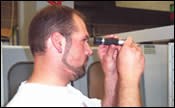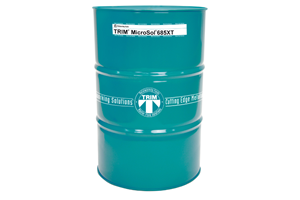Synthetic Coolant Shines In Shop-Wide Applications
TNS Machining (Muskego, Wisconsin) is both a prototype and production machining job shop. After working in the machining industry for many years, Thomas Rowinski, Jr. and his sons started this business in 1981 because they wanted to provide customers with specialized precision machined parts.
TNS Machining (Muskego, Wisconsin) is both a prototype and production machining job shop. After working in the machining industry for many years, Thomas Rowinski, Jr. and his sons started this business in 1981 because they wanted to provide customers with specialized precision machined parts. The business has since flourished because of its reputation and the quality work it has performed for a range of industries. Sales growth has continued primarily through customer referrals, testimonials and word of mouth. Its client base is widespread, with parts being shipped throughout North America. The company serves various industries, including medical, food, bottling, beverage, hydraulic, electromagnetic, automotive, recreational equipment and tooling.
Typical jobs range from a few prototypes to multi-million parts production runs. The company uses CNC machining centers, lathes, grinders, chuckers and screw machines. It also performs secondary operations such as cross drilling, deburring, thread cutting and thread forming. Several types of cutting tools are used to machine a spectrum of metals and materials such as carbon steel in various grades, stainless steel, aluminum, copper, brass and plastics. On a typical day, milling, drilling, tapping, reaming and grinding are running simultaneously.
Because of its multiple workpiece materials and machining applications, TNS has been searching for one coolant that can be used in all machines requiring a water-soluble fluid. Through the years, the shop has tried soluble oils, semi-synthetics and synthetics. In its experience, none of these products were entirely satisfactory. Problems included “Monday morning stink,” troublesome residues (both tacky and oily), rusty parts, dermatitis, tramp oil contamination, fuzzy refractometer readings, inadequate lubrication, short sump life, excessive foaming, discoloration and excessive bacterial growth. The company has tried many of the “Band-Aid” remedies, such as tank-side additives of liquids or tablets and special filtration devices. The problems were often impossible to control when machining jobs changed and machine sumps remained shut down for several days, which allowed biological organisms to grow. For example, grinding swarf became a bio-breeding ground, and, over time, it destroyed all three types of coolant previously used. In addition, Muskego’s water quality can vary seasonally from moderate to hard, causing coolant performance to suffer. As with all coolant systems, evaporation from sumps and systems compounded the coolant problems by concentrating the water’s contamination.
While coolant control issues were troublesome, machining problems caused by a coolant’s variation also became problematic at times. For example, lubrication in an aluminum threading operation would degrade over time, causing threads to be pulled out by the tool. In other operations, the surface finish would become unacceptable and tooling life would be decreased. Often, the only solution was to replace both the coolant and tooling, causing a loss in productivity. At this point, TNS’ 20-year goal to find one universal and consistent coolant seemed unattainable.
Scott Rowinski, vice president of TNS, presented this challenge to Pico Chemical Corporation (Chicago Heights, Illinois). After surveying TNS’ facility, Pico’s sales representative and technical personnel felt that Picocool 5254, a newly developed synthetic coolant, could function well in the various operations, while maintaining its performance with the local water conditions. It was believed that this oil-free coolant would keep the sumps and delivery systems free of bacterial problems after a thorough chemical and mechanical cleaning. Because of its high lubricity and resistance to foaming, this coolant was also chosen to handle the aluminum and stainless steel applications in the CNC and centerless grinding spray delivery systems.
Its developers explain that Picocool 5254 is formulated with special polymers and is balanced with additives such as surface-active agents that will not foam under high-pressure conditions. Unlike emulsified oil mixtures, the lubricant particles remain a uniform size in the presence of contamination in the water, and because the coolant is a synthetic product, it does not provide a food source for bacteria and other organisms.
According to Mr. Rowinski, this coolant has met every objective from the day it was introduced and is now regarded as the “universal and versatile” coolant for the company’s water-soluble systems. He especially valued its consistency and trouble-free operation. All coolant systems are kept in a 6 to 8 percent concentration and are routinely checked with a refractometer. No other controls or additives are needed, he reports. Since switching to the synthetic, coolant consumption has been reduced by 50 percent.
For steel grinding applications in which stock removal ranges from 0.0005 to 0.002 inch, the coolant improved ground surface finishes. Bacterial growth does not occur if cast iron or steel swarf has accumulated in the bottom of sump tanks.
With this coolant, thread quality improved in tapping and thread forming of 1018 and 4140 steel. It is reported that the Picocool 5254 also provides superior lubrication on small-diameter tapped holes in 6061 aluminum. After continual production runs, the shop is holding metric thread specifications in aluminum without tap changes. Previously used coolants could not penetrate as well into the blind holes. This inadequate lubricant allowed galling to occur.
Precision machining of both 7075 and 6061 cast and wrought aluminum alloys has become routine and finishes are smoother, the shop reports. “Production runs have been extended between tool changes, and in some cases, the improvement in tool life has been more than 100 percent,” Mr. Rowinski says. He estimates that the shop has increased productivity by 30 to 40 percent with the new coolant, mainly because surface finish requirements can be met on a more consistent basis.
Another benefit of the coolant is the fact that it’s a clear solution, so shop personnel can inspect workpieces and cutting tools during machining. The coolant does not leave oily or sticky residues on the machinery or workpieces. All tramp oils quickly separate from the coolant and can be skimmed off. During severe machining, this synthetic coolant does not produce oil smoke or heat-generated vapor mists. Using standard hygiene practices, workers can handle parts without experiencing skin problems. By resisting rancidity and the oil “split-outs” associated with it, the coolant has a longer sump life. The extended life of the coolant means fewer clean outs, less product consumption and reduced waste disposal costs. The shop says that no chemical additives, oxygenated gases or auxiliary equipment treatments are needed to keep coolant solutions fresh and clean in its facility.
The fact that this product contains no mineral oil or chlorinated paraffin means that waste treatment, oily residues and bacterial growth have been significantly reduced as well.
TNS says it has found a single coolant that does not produce the problems experienced with other coolants. This has improved the company’s productivity, while reducing its operating costs. Using the same coolant across the board has reduced potential coolant mix-ups and confusion over different maintenance procedures.
Related Content
Hennig Inc. Acquires Industrial Coolant Systems
ICS develops and field tests high-pressure coolant systems, coolant filtration systems and other machine tool solutions.
Read MoreAutomating Cutting Fluid Management
Automation can amplify the benefits of cutting fluid management while reducing the maintenance burden on shopfloor employees.
Read MoreMaster Fluid Solutions Semisynthetic Coolant Improves Sump Life
Trim MicroSol 685XT is designed to provide enhanced corrosion inhibition on all ferrous and nonferrous metals.
Read MoreFluidLynx Offers Intelligent Cooling Lubricant Automation
PMTS 2023: Motorex’s FluidLynx automated fluid management system offers controllable and traceable process reliability, while better protecting workpieces and machines, and optimizing tool life.
Read MoreRead Next
Coolant-Through Turning Toolholders Deliver Increased Performance And Tool Life
It should be obvious to anyone who has ever washed a driveway or patio with a garden hose: For the best results, you must keep the stream of water precisely where it's needed. The same principle applies to delivering coolant to the cutting zone.
Read MoreEmerging Leaders Nominations Now Open
Here’s your chance to highlight a young person in your manufacturing business who is on the path to be a future leader moving your company forward.
Read More






















